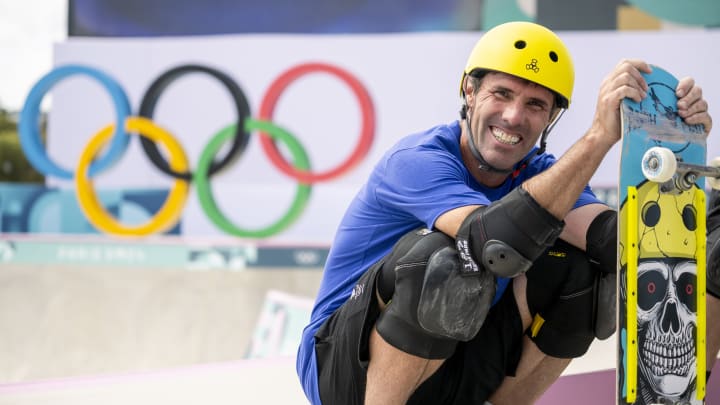51-Year-Old Skateboarder Andy Macdonald Is Having the Time of His Life at the Paris Olympics

PARIS — At first glance, Andy Macdonald looks like his opponents at La Concorde skate park, whipping down into the bowl and flying above it, transitioning from body varial 540 to madonna to nollie kickflip. But then he takes off his helmet to reveal his gray hair.
That nollie kickflip? He invented it—in 1993. Macdonald, 51, has been skateboarding since before all but one of his opponents in Olympic men’s park skateboarding were born.
“He’s got a minivan,” says Alex Sorgente, a 26-year-old representing Italy. “He’s got three kids. He’s such, like, a soccer dad. But he’s out here competing against us. It’s so rad.”
Macdonald, who became the oldest Olympic skateboarder since the sport joined the program in Tokyo, finished 18th of 22 in the preliminaries in Wednesday’s park event and did not advance to the final. But standing here in his "Team GB" dad hat, knee-length basketball shorts and sock tan, looking as if he says, “Looks like we got here just in time!” when a line forms behind him and “Time to rock and roll!” when he leaves a restaurant, he is thrilled.
“People are like, ‘Are you going for the gold?’” he says. “I’m like, ‘If they’re giving away gold medals for whoever has the most fun, I got it wrapped up!”
He adds, “I was trying to represent, like, ‘Hey, this is fun, no matter what age you are.’ This is, like, the coolest, funnest, most inclusive thing that you can do. And it’s my livelihood. I’m lucky enough that I can make a living doing it. But it keeps me young. Skateboarding is my fountain of youth. I’ve been doing it since I was 12 years old. And I’m 51 and still enjoying every minute of it.”
Most of his peers have not even gotten to Ponce de Leon in history class yet. Coco Yoshizawa, 14, of Japan, won the women’s street skateboarding event last week—which made her the oldest Olympic champion in the history of the event, since in Tokyo, her countrywoman Momiji Nishiya, 13, took first place. The men tend to be a bit older—the medalists in Macdonald’s event were Keegan Palmer, 21, of Australia; Tom Schaar, 24, of the United States; and Sorgente—but a quarter of the field need their parents’ permission to see an R-rated movie.
Except for one. Dallas Oberholzer, 49, of South Africa, is Olympic skateboarding’s other grandfather, and although he finished last on Wednesday, he too is having a great time. Macdonald is a legend of the sport who was last in Paris nearly two decades ago to do a demonstration at the Grand Palais with Tony Hawk, the most famous skateboarder ever; Oberholzer, who has no sponsors, rented out his apartment in Cape Town to finance his trips to Olympic qualifiers.
“As an elder,” Oberholzer says, “I’m here to look out over the younger generation, so I can report back, and I can approach these world skate guys and go, ‘Hey, you know what?’ Because these young people are not going to have a voice, and I sure as s*** ain’t scared of being a punk and having a voice.”
As the sport—which many skateboarders contend is more of an art—becomes dominated by young kids, Oberholzer wants to maintain the culture that has given him so much. He sees it especially in opposition to sports such as soccer, where the Canadian women’s team was recently hit with penalties for illegally filming opponents’ practices.
“We as skateboarders really need to come together—as we do,” he says. “I think we rise above all the other sporting codes when you see how united we are. There’s no spying on each other with drones. Andy Mac was giving me tips the other day because I was doing something wrong. We’re helping each other, and we just want each other to have the best session possible.”
That perhaps explains why Macdonald’s fellow skateboarders were so thrilled when he qualified for the Olympics. He is American, but his father, Roderick, was born in Luton, England, which allowed Macdonald to take a shot at making the Great Britain team. He won 23 X Games gold medals in vertical, or vert, skateboarding, but since that is not an Olympic discipline, he competed in park. Because vert tends to take place on a wooden halfpipe and a fall gives you a chance to slide down a bit before you crash, it is much easier on the body than park, where everything is cement and you hit bottom immediately. Macdonald laughs when he sees teenagers wipe out and pop back up and try again, knowing a similar injury would have him out for a week.
“When he made it, we were like, ‘F***, you deserve it,’” says Danny Leon, 29, of Spain, with a laugh. (He is perhaps Macdonald’s biggest fan, because when Macdonald is not around, Leon is the grandfather. “One girl asked me, ‘Are you married?’” he says. “I was like, ‘No, I’m not.’ ‘But you’re 29!’”)
And they’re all having fun. Macdonald is willing to take the jabs for his wardrobe (“Colors [from the] 80s,” says Leon. “Everything now is black and white”) and his equipment (“The skull on his board graphic,” says Luigi Cini, 22, of Brazil. “Skulls are kind of, like, old-man stuff.”), but there is one point he wishes to clarify: It’s not a minivan. “I drive a Volkswagen camper van,” he says. “I drove it for 20-plus years. It was the beachgoer, taking the family camping and stuff. And I just finally sold it and got an electric car. So I’m getting with the times.”
